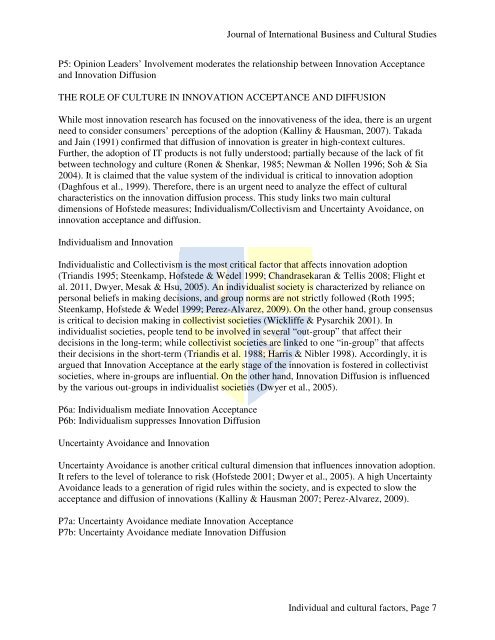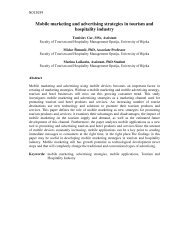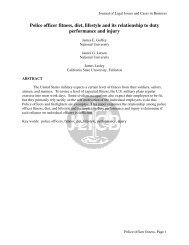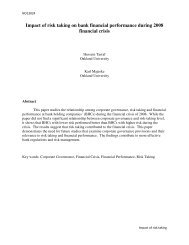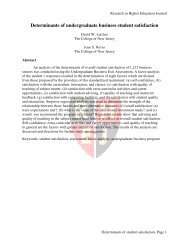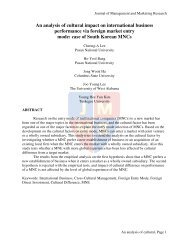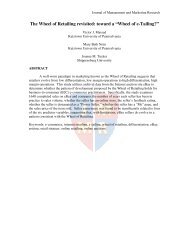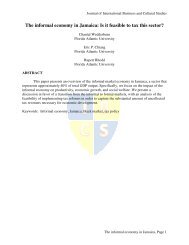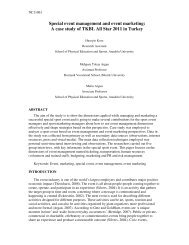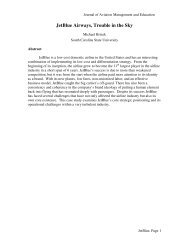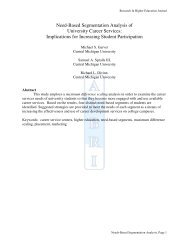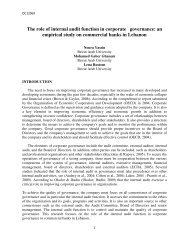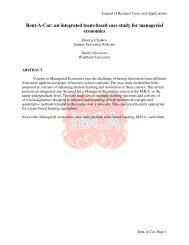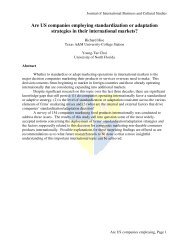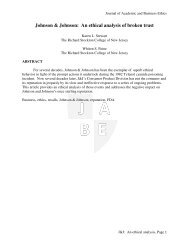Individual and cultural factors affecting diffusion of innovation
Individual and cultural factors affecting diffusion of innovation
Individual and cultural factors affecting diffusion of innovation
Create successful ePaper yourself
Turn your PDF publications into a flip-book with our unique Google optimized e-Paper software.
Journal <strong>of</strong> International Business <strong>and</strong> Cultural Studies<br />
P5: Opinion Leaders’ Involvement moderates the relationship between Innovation Acceptance<br />
<strong>and</strong> Innovation Diffusion<br />
THE ROLE OF CULTURE IN INNOVATION ACCEPTANCE AND DIFFUSION<br />
While most <strong>innovation</strong> research has focused on the innovativeness <strong>of</strong> the idea, there is an urgent<br />
need to consider consumers’ perceptions <strong>of</strong> the adoption (Kalliny & Hausman, 2007). Takada<br />
<strong>and</strong> Jain (1991) confirmed that <strong>diffusion</strong> <strong>of</strong> <strong>innovation</strong> is greater in high-context cultures.<br />
Further, the adoption <strong>of</strong> IT products is not fully understood; partially because <strong>of</strong> the lack <strong>of</strong> fit<br />
between technology <strong>and</strong> culture (Ronen & Shenkar, 1985; Newman & Nollen 1996; Soh & Sia<br />
2004). It is claimed that the value system <strong>of</strong> the individual is critical to <strong>innovation</strong> adoption<br />
(Daghfous et al., 1999). Therefore, there is an urgent need to analyze the effect <strong>of</strong> <strong>cultural</strong><br />
characteristics on the <strong>innovation</strong> <strong>diffusion</strong> process. This study links two main <strong>cultural</strong><br />
dimensions <strong>of</strong> H<strong>of</strong>stede measures; <strong>Individual</strong>ism/Collectivism <strong>and</strong> Uncertainty Avoidance, on<br />
<strong>innovation</strong> acceptance <strong>and</strong> <strong>diffusion</strong>.<br />
<strong>Individual</strong>ism <strong>and</strong> Innovation<br />
<strong>Individual</strong>istic <strong>and</strong> Collectivism is the most critical factor that affects <strong>innovation</strong> adoption<br />
(Tri<strong>and</strong>is 1995; Steenkamp, H<strong>of</strong>stede & Wedel 1999; Ch<strong>and</strong>rasekaran & Tellis 2008; Flight et<br />
al. 2011, Dwyer, Mesak & Hsu, 2005). An individualist society is characterized by reliance on<br />
personal beliefs in making decisions, <strong>and</strong> group norms are not strictly followed (Roth 1995;<br />
Steenkamp, H<strong>of</strong>stede & Wedel 1999; Perez-Alvarez, 2009). On the other h<strong>and</strong>, group consensus<br />
is critical to decision making in collectivist societies (Wickliffe & Pysarchik 2001). In<br />
individualist societies, people tend to be involved in several “out-group” that affect their<br />
decisions in the long-term; while collectivist societies are linked to one “in-group” that affects<br />
their decisions in the short-term (Tri<strong>and</strong>is et al. 1988; Harris & Nibler 1998). Accordingly, it is<br />
argued that Innovation Acceptance at the early stage <strong>of</strong> the <strong>innovation</strong> is fostered in collectivist<br />
societies, where in-groups are influential. On the other h<strong>and</strong>, Innovation Diffusion is influenced<br />
by the various out-groups in individualist societies (Dwyer et al., 2005).<br />
P6a: <strong>Individual</strong>ism mediate Innovation Acceptance<br />
P6b: <strong>Individual</strong>ism suppresses Innovation Diffusion<br />
Uncertainty Avoidance <strong>and</strong> Innovation<br />
Uncertainty Avoidance is another critical <strong>cultural</strong> dimension that influences <strong>innovation</strong> adoption.<br />
It refers to the level <strong>of</strong> tolerance to risk (H<strong>of</strong>stede 2001; Dwyer et al., 2005). A high Uncertainty<br />
Avoidance leads to a generation <strong>of</strong> rigid rules within the society, <strong>and</strong> is expected to slow the<br />
acceptance <strong>and</strong> <strong>diffusion</strong> <strong>of</strong> <strong>innovation</strong>s (Kalliny & Hausman 2007; Perez-Alvarez, 2009).<br />
P7a: Uncertainty Avoidance mediate Innovation Acceptance<br />
P7b: Uncertainty Avoidance mediate Innovation Diffusion<br />
<strong>Individual</strong> <strong>and</strong> <strong>cultural</strong> <strong>factors</strong>, Page 7


